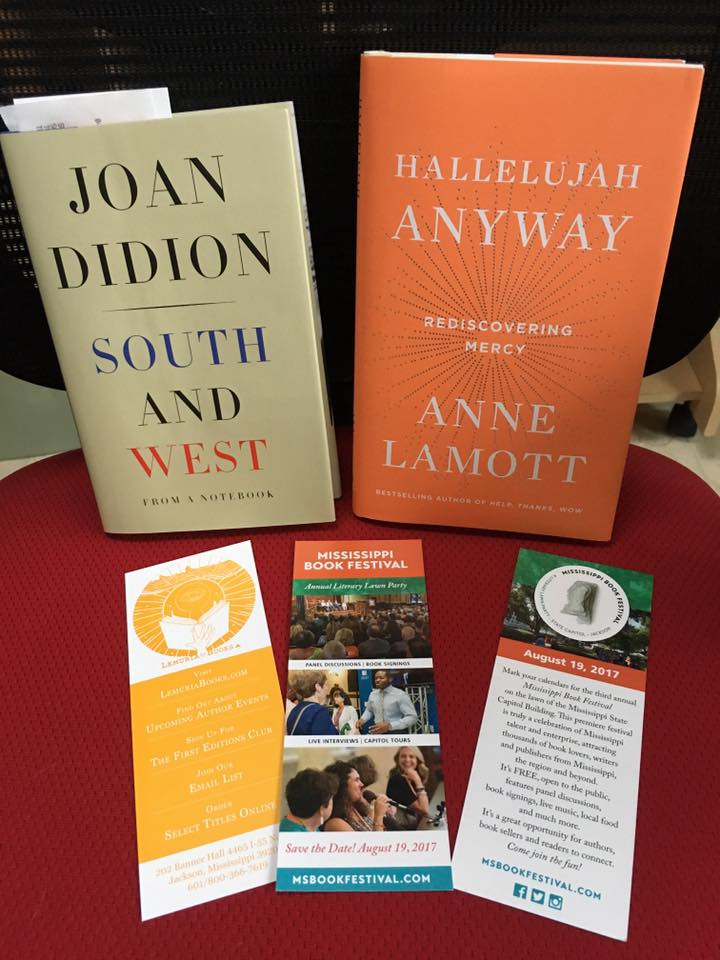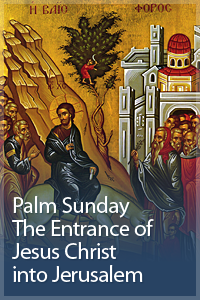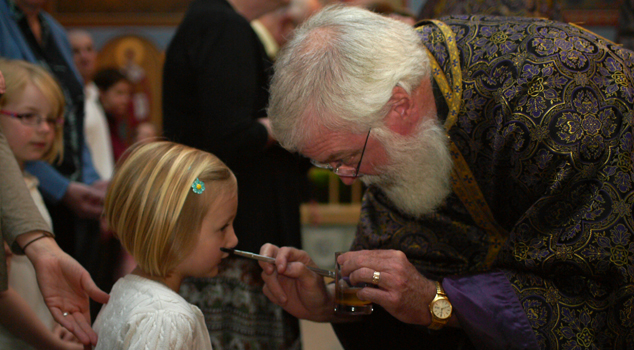
When I was in Jackson, Mississippi, on Monday (my husband had a medical meeting there) I stopped in at Lemuria Books (where I had a reading/signing last Thursday) to visit with bookstore owner John Evans. We discussed this summer’s Mississippi Book Festival and other literary and publishing topics. As I was speaking with one of the booksellers who works there, I discovered these two books at the counter: Joan Didion’s South and West, in which she brings notes from a 1970s road trip journal she took with her husband through Mississippi, Louisiana, and Alabama into the present cultural and political milieu; and Anne Lamott’s latest book, Allelujah Anyway: Rediscovering Mercy. I love Didion and look forward to diving into her essays, especially since they are about the South, but it was the subtitle of Lamott’s book that drew me in immediately: “Rediscovering Mercy.”
As an Orthodox Christian, I am half way through Holy Week, which follows our forty-day spiritual journey known as Great Lent. It’s a “school of repentance” we enter as we walk through Christ’s death and resurrection, but it’s also a time to rejoice in His great MERCY.
This past Sunday our pastor, Father Phillip Rogers, talked about mercy in his homily. I love that both he and our young assistant pastor, Father Alex Mackoul, have kept such a positive, upbeat focus during Lent, rather than overwhelming us with too-heavy burdens for our already difficult ascetic struggles. Instead of reminding us of our shortcomings (don’t we all feel the weight of them without others pointing them out?) Father Phillip reminds us of God’s mercy. He did this with me in a very personal way when he heard my confession a couple of weeks ago. And then he encouraged all of us to discover this afresh in his homily by challenging us to read Psalm 117 every day during Holy Week. He said it would change us. I believed him.
My husband and I love this Psalm, especially verse 24, which we say to each other as greeting and response first thing every morning (a tradition we learned from my parents): “This is the day the Lord has made; Let us greatly rejoice, and be glad therein.” But I hadn’t read the entire Psalm (29 verses) all at once in quite some time. We hear much of it during the services in the Orthodox Church, so the verses were familiar as my husband and I read them together on Monday, and I read them again with my morning prayers yesterday and today. Here are a few verses:
Give thanks to the Lord, for He is good;
For His mercy endures forever.
Let the house of Israel say that He is good,
For His mercy endures forever….
The Lord is my strength and my song,
And He became my salvation.
The sound of exceeding joy and salvation
Is in the tents of the righteous;
The right hand of the Lord exalted me;
The right hand of the Lord worked its power….

Appoint a feast for yourselves, decked
with branches,*
Even to the horns of the altar.
You are my God, and I will thanks to You;
You are my God, and I shall exalt you….
Give thanks to the Lord, for He is good;
For His mercy endures forever.
*We were celebrating the Feast of Palm Sunday, raising our palm branches as we processed outside the church remembering Christ’s victorious entry into Jerusalem.
At this time in our country, in our world, we need God’s mercy more than ever. How wonderful to rediscover it this week, both in Anne Lamott’s book, and in Psalm 117. As Lamott says:
I’m not sure I even recognize the ever-presence of mercy anymore, the divine and the human; the messy, crippled, transforming, heartbreaking, lovely, devastating presence of mercy. But I have come to believe that I am starving to death for it, and my world is, too.
But what does Lamott mean when she writes of mercy?
Mercy is radical kindness. Mercy means offering or being offered aid in desperate straits. Mercy is not deserved. It involves absolving the unabsolvable, forgiving the unforgivable. Mercy brings us to the miracle of apology, given and accepted, to unashamed humility when we have erred or forgotten…. The idea of accepting life as it presents itself and doing goodness anyway…. Yes, because in the words of Candi Staton’s great gospel song, “hallelujah anyway.” Hallelujah that in spite of it all, there is love, there is singing, nature, laughing, mercy.

I am so thankful to King David (who wrote Psalm 117), Anne Lamott, and Father Phillip Rogers for helping me rediscover mercy during this beautiful Holy Week. Tonight I will experience another taste of that mercy at the sacrament of Holy Unction at St. John Orthodox Church. When the holy oil is placed on our heads and hands, the priest will ask God to heal the disorders of our souls and bodies. That healing—which each of us will experience in a personal way, according to our own physical, mental, and spiritual brokenness—will indeed be an outpouring of God’s mercy. I hope I will go forth from this sacrament with the familiar words, “Lord, have mercy,” on my lips and in my heart.
Thank you, Susan, for the meditation on mercy. Last year, Pope Francis declared a jubilee year dedicated to mercy, so it is something that Catholics recently spent a lot of time studying and celebrating. One of the things that you touched on and that continues to resonate with me is that true mercy is not just forgiveness but the eternal outpouring of lovingkindness, which leads to true justice for the oppressed and afflicted and true care for the earth and for all beings. Wishing you the continued blessings of Holy Week and a joyous Easter!
I love what you shared from Pope Francis. Blessed Pascha/Easter to you!
Susan, this is such a beautiful article, reminding us of the loveliness and expansiveness of God’s mercy. And thank you for introducing me to Anne Lamott’s newest book, which I’m going to order today. She’s been a favorite of mine since “Bird by Bird.”
“Give thanks to the Lord, for He is good;
For His mercy endures forever.”
Thanks, Susan. I’m really enjoying Lamott’s book. I loved “Help, Thanks, Wow,” and this is in that same tone.